My research seeks to understand creative process and build novel computational creativity support tools to enhance creative work across domains including writing, CS education, and design. I apply a computational lens to creativity research, drawing on technical skills from computer science and design in combination with other disciplines, including the humanities, to expand the communities, values, and ways of working that our software tools support. I lead the Process, Interaction, and Creativity Lab (PICL) at UIUC.
I received my PhD in Computer Science from the University of California, Berkeley, where I worked in human computer interaction with Eric Paulos in the Hybrid Ecologies Lab at UC Berkeley. I received an MS in Computer Science and a BS in Product Design from Stanford University.
For prospective students:If you are a prospective graduate student interested in HCI, creativity, or education, apply to UIUC Computer Science and mention me in your application!
Publications
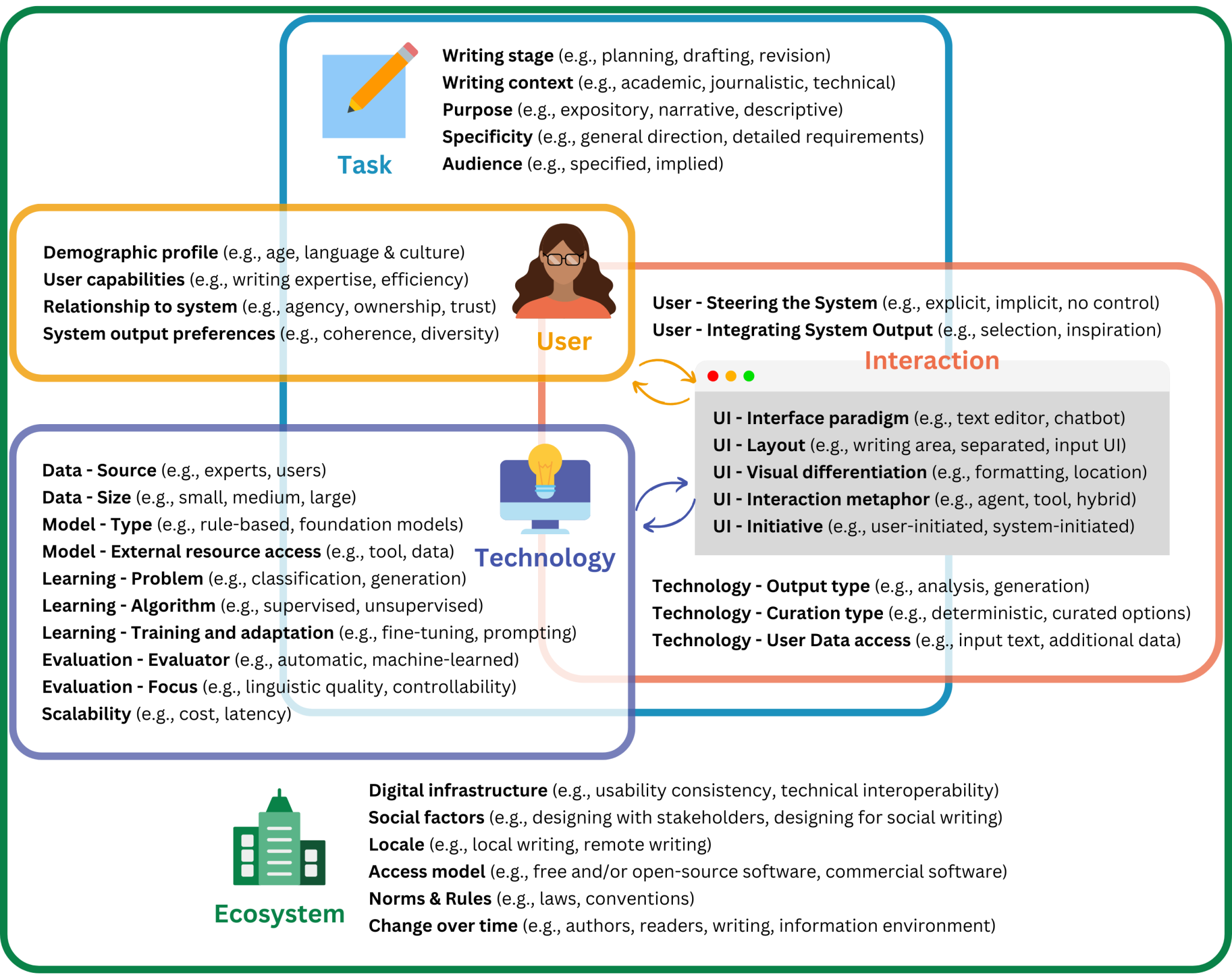 |
A Design Space for Intelligent and Interactive Writing AssistantsMina Lee, Katy Ilonka Gero, John Joon Young Chung, Simon Buckingham Shum, Vipul Raheja, Hua Shen, Subhashini Venugopalan, Thiemo Wambsganss, David Zhou, Emad A. Alghamdi, Tal August, Avinash Bhat, Madiha Zahrah Choksi, Senjuti Dutta, Jin L.C. Guo, Md Naimul Hoque, Yewon Kim, Simon Knight, Seyed Parsa Neshaei, Antonette Shibani, Disha Shrivastava, Lila Shroff, Agnia Sergeyuk, Jessi Stark, Sarah Sterman, Sitong Wang, Antoine Bosselut, Daniel Buschek, Joseph Chee Chang, Sherol Chen, Max Kreminski, Joonsuk Park, Roy Pea, Eugenia Ha Rim Rho, Zejiang Shen, Pao SiangliulueCHI 2024
In our era of rapid technological advancements, the research landscape for writing assistants has become increasingly fragmented across various research communities. We seek to address the challenge by proposing a design space as a structured way to examine and explore the multidimensional space of intelligent and interactive writing assistants. Through community collaboration, we explore five aspects of writing assistants: task, user, technology, interaction, and ecosystem. Within each aspect, we define dimensions and codes by systematically reviewing 120 papers while leveraging the expertise of researchers in various disciplines. Our design space aims to offer researchers and designers a practical tool to navigate, comprehend, and compare the various possibilities of writing assistants, and aid in the design of new writing assistants.
|
 |
Kaleidoscope: A Reflective Documentation Tool for a User Interface Design CourseSarah Sterman, Molly Nicholas, Janaki Vivrekar, Jessie Mindel, Eric PaulosACM Conference on Human Factors in Computing Systems (CHI), 2023
Presents Kaleidoscope, a novel tool for documenting and interacting with design history in studio HCI courses. We deployed this tool in an upper-level HCI course during the COVID-19 pandemic to support student learning through feedback, reflection, and interactions with project histories.
 Best Paper Award Best Paper Award |
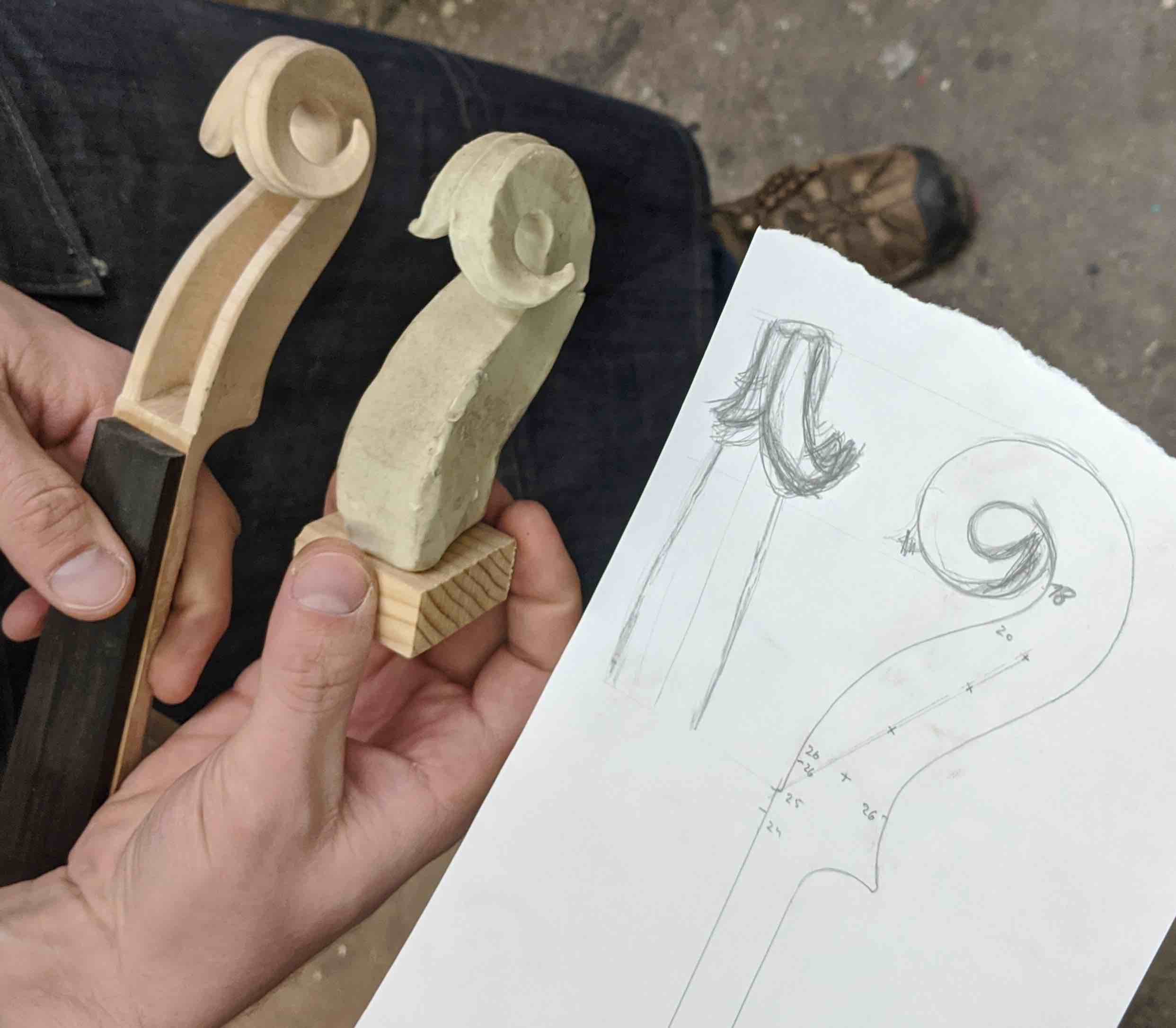 |
Towards Creative Version ControlSarah Sterman*, Molly Nicholas*, Eric PaulosACM Conference On Computer-Supported Cooperative Work And Social Computing (CSCW), 2022
Explores how creative practitioners use version control tools and history information in creative process, and introduces four key considerations for version control in creative work: using versions as a palette of materials, providing confidence and freedom to explore, leveraging low-fidelity version capture, and reflecting on and reusing versions across long time scales. We discuss how the themes present across this wide range of mediums and domains can provide insight into future designs and uses of version control systems to support creative process.
|
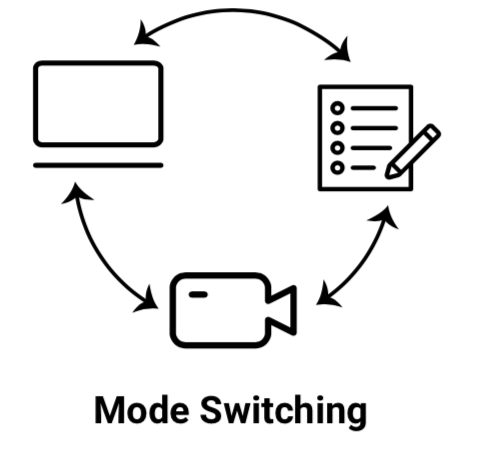 |
Creative and Motivational Strategies of Expert Creative PractitionersMolly Nicholas*,Sarah Sterman*, Eric PaulosACM Conference on Creativity & Cognition (C&C), 2022
Explores how creative practitioners intentionally manage their creative process, for example by developing strategies to break out of ruts or stay motivated through uncertainty. Understanding the way experts engage with and manage creativity-relevant processes represents a rich source of foundational knowledge for designers of creativity support tools. We identify four strategies for managing process and discuss implications for the design of process-focused creativity support tools.
 Best Paper Award Best Paper Award |
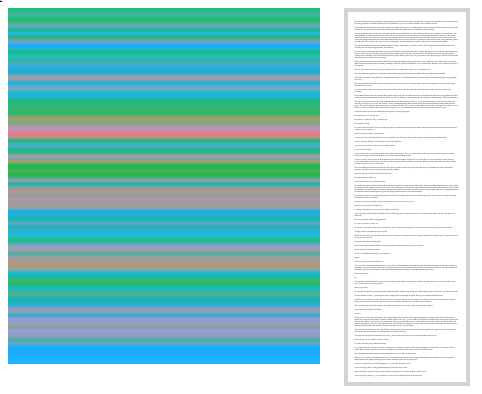 |
Interacting with Literary Style through Computational ToolsSarah Sterman, Evey Huang, Vivian Liu, Eric PaulosACM Conference on Human Factors in Computing Systems (CHI), 2020
Presents a computational technique to surface style in written text. We collect a dataset of crowdsourced human judgments of style, derive a model of style by training a neural net on this data, and present novel applications for visualizing and browsing style across broad bodies of literature, as well as an interactive text editor with real-time style feedback. We study these interactive style applications with users and discuss implications for enabling this novel approach to style.
|
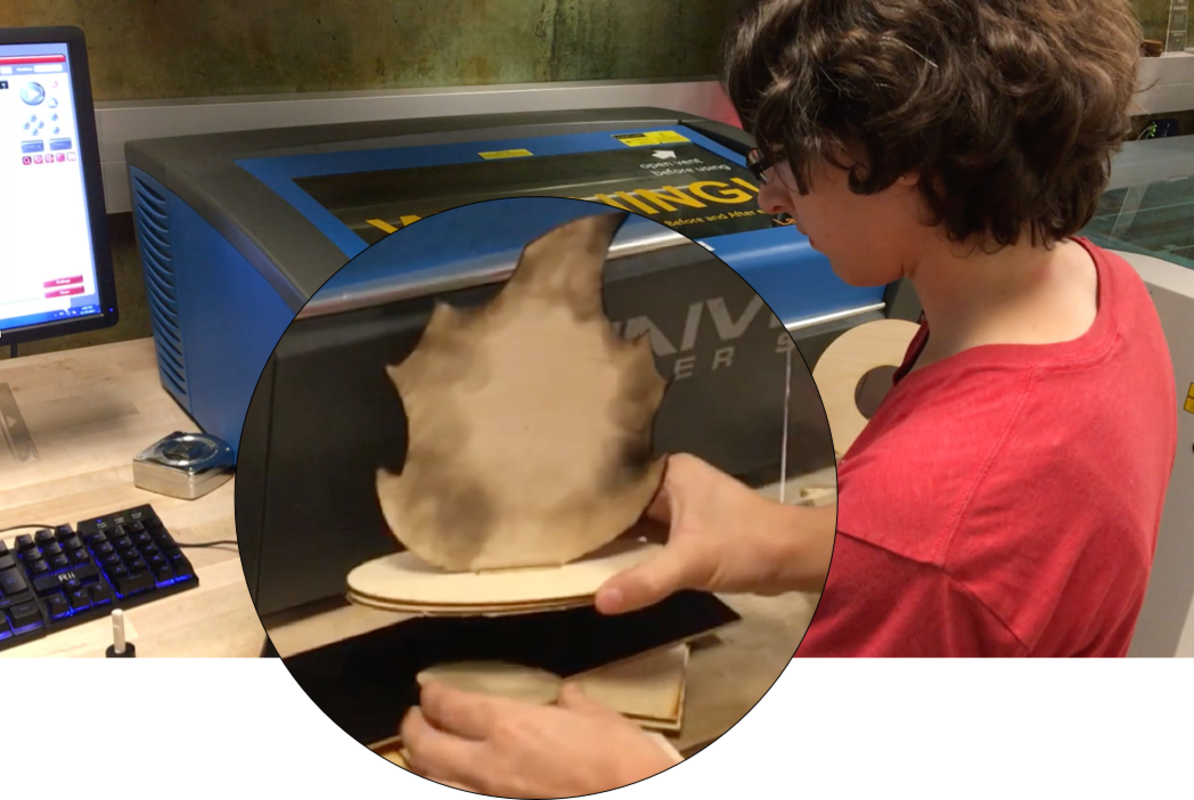 |
Guardians of Practice: A Contextual Inquiry of Failure-Mitigation Strategies within Creative PracticesCesar Torres, Sarah Sterman, Molly Nicholas, Richard Lin, Eric Pai, Eric PaulosACM Conference on Designing Interactive Systems (DIS), 2018
Outlines the design space of "guardians", or elements of a creative practice that mitigate the psychological effects of failure to create cultures of resiliency and perseverance. Through contextual inquiry, we contribute an inventory of failure-mitigation strategies from a variety of creative disciplines. We synthesize guidelines for the design of new guardians and present a preliminary exploration of guardians for the lasercutting practice.
|
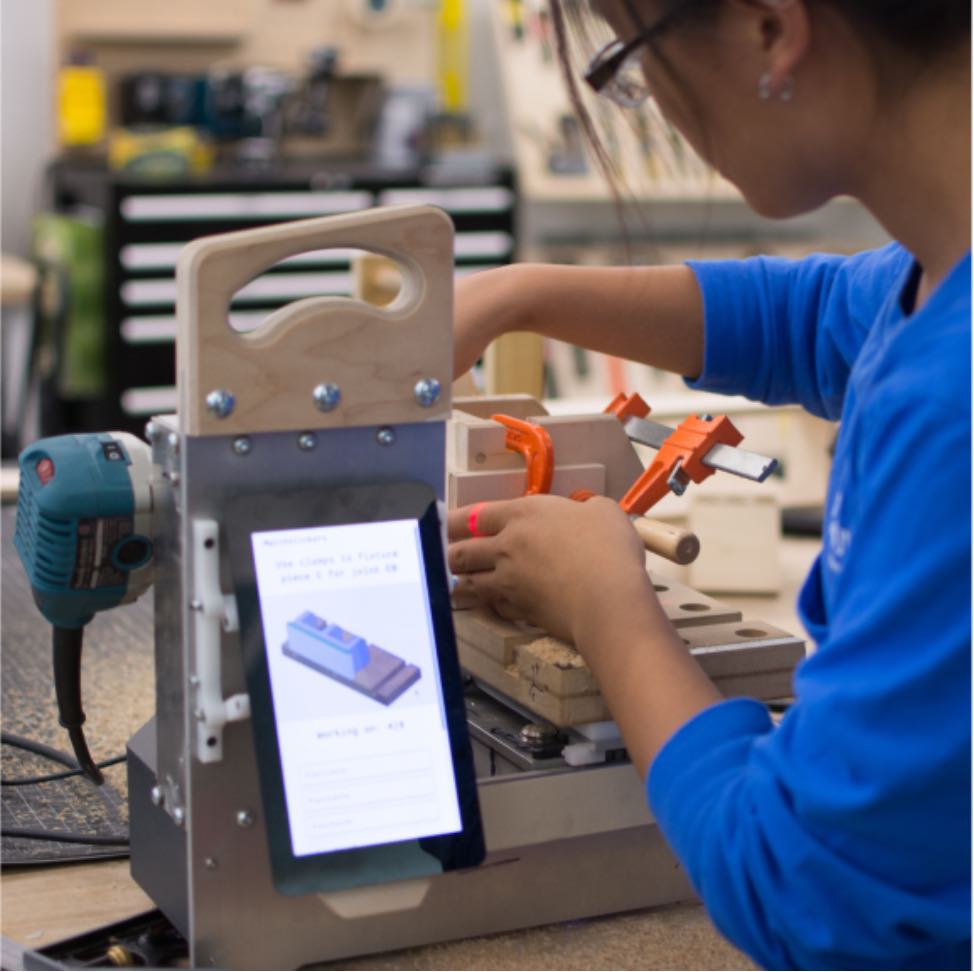 |
MatchSticks: Woodworking through Improvisational Digital FabricationRundong Tian, Sarah Sterman, Ethan Chiou, Jeremy Warner, Eric PaulosACM Conference on Human Factors in Computing Systems (CHI), 2018
Presents a novel digital fabrication system tailored for joinery. Combining a portable CNC machine, touchscreen user interface, and parametric joint library, MatchSticks enables makers of varying skill to rapidly explore and create artifacts from wood. Our system embodies tacit woodworking knowledge and distills the distributed workflow of CNC tools into a hand tool; it operates on materials existing machines find difficult, produces assemblies much larger than its workspace, and supports the parallel creation of geometries.
 Best Paper Honorable Mention Best Paper Honorable Mention |
 |
HäirIÖ: Human Hair as Interactive MaterialChristine Dierk, Sarah Sterman, Molly Nicholas, Eric PaulosACM Conference on Tangible, Embedded, and Embodied Interaction (TEI), 2018
Presents an exploration and working prototype of hair as a site for novel interaction, leveraging hair's position as something both public and private, social and personal, malleable and permanent. We develop applications and interactions around this new material in HäirIÖ: a novel hair-based technology that combines capacitive touch input and dynamic output through color and shape change.
|
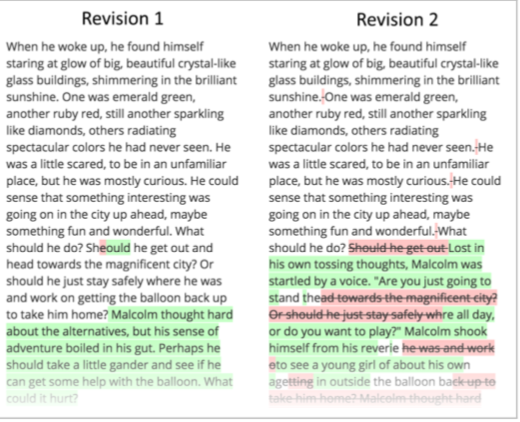 |
Mechanical Novel: Crowdsourcing Complex Work through Reflection and RevisionJoy Kim, Sarah Sterman, Allegra Argent Beal Cohen, Michael S. BernsteinACM Conference on Computer Supported Cooperative Work and Social Computing (CSCW), 2017
Introduces a technique for achieving interdependent complex goals with crowdsourcing, such as fiction writing. We embody this approach in Mechanical Novel, a system that crowdsources short fiction stories on Amazon Mechanical Turk. In a field experiment, Mechanical Novel resulted in higher-quality stories than an iterative crowdsourcing workflow.
|
Recent News
- March 2024 - Excited our DIS 2024 workshop has been accepted. Join us to talk about pedagogy in creative physical computing -- more info soon!
- March 2024 - Visiting University of Washington and talking about process at the Machine Agency Lab
- March 2024 - Guest lecture at iCAN -- great chats about bringing your whole perspective to computing research.
- February 2024 - Talking about sketching at the UCSD Design Lab
- January 2024 - Excited our CHI 2024 collaboration has been accepted: A Design Space for Intelligent and Interactive Writing Assistants! Amazing to work with the whole team!
- November 2023 - Our proosal for the 3rd workshop on Intelligent and Interactive Writing Assistants has been accepted at CHI 2024 -- hope to see you there!
Teaching
- Outstanding Graduate Student Instructor Award, UC Berkeley
- UC Berkeley Certificate in Teaching and Learning in Higher Education
-
InstructorUIUCFall 2023
-
CS 160: User Interface Design and DevelopmentInstructorUC BerkeleySummer 2019
-
Graduate Student InstructorUC BerkeleySpring 2019
-
Graduate Student InstructorUC BerkeleySpring 2018
-
CS 101: Introduction to Computing PrinciplesTeaching AssistantStanford UniversitySpring 2016
-
CS 247: Human-Computer Interaction Design StudioTeaching AssistantStanford UniversityWinter 2016
-
CS 105: Introduction to ComputersHead Teaching AssistantStanford UniversityWinter 2015
-
CS 122: Artificial Intelligence – Philosophy, Ethics, and ImpactTeaching AssistantStanford UniversityFall 2014
-
CS 142: Web ApplicationsTeaching AssistantStanford UniversitySpring 2014
-
CS 181: Computers, Ethics, and Public PolicyTeaching AssistantStanford UniversityFall 2013; Winter 2014
-
CS 103: Mathematical Foundations of ComputingTeaching AssistantStanford UniversitySummer 2013
-
CS 106a: Programming MethodologySection LeaderStanford UniversitySpring 2012
-
CS 2C: Introduction to Multimedia ProductionSection InstructorStanford UniversityWinter 2012
-
CS 1C: Introduction to ComputingSection InstructorStanford UniversityFall 2011